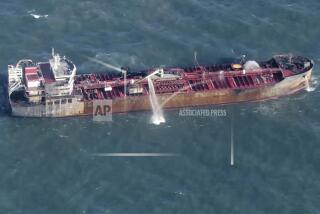Troubled Tankers Threaten U.S. Waters
- Share via
BOSTON — Conditions aboard the Norwegian tanker Iver Christina were so threatening to the environment that federal officials refused to let it enter Boston Harbor to unload its 12.6 million gallons of industrial oil.
Inspection parties in November found that the vessel carried oil instead of water in its ballast tanks and had inoperable valves and rusted ventilation systems that posed major threats to the environment.
In addition to being barred from the harbor, the ship’s international certificate was revoked. Both were drastic and nearly unprecedented steps that officials said were dictated by the threat of a potential spill.
But they concede that defective vessels such as the Iver Christina come and go in U.S. and international ports carrying serious potential threats to the environment.
“How many more spills is it going to take before we realize this is a very serious problem that needs our immediate attention?” asks Lisa Weil, policy director for the American Oceans Campaign, an environmental group.
Despite the scrutiny that has followed damaging oil spills, an increasing number of tankers are plying the oceans with significant safety violations that could threaten the environment, U.S. regulators say.
“We could end up with a problem at any time,” said William H. Boland Jr., captain of the port of Boston. “Since the Exxon Valdez, we’re all a little more aware about what dangers tankers may pose to a port. My concern is whether it’s liable to become a trend.”
In addition to the Iver Christina, the Coast Guard stopped two other tankers from entering or unloading at ports in Maine and Massachusetts because of similar deficiencies. One had an operating manual in a language understood by no one on the crew except a steward.
The vessels were allowed to unload after their problems were corrected, but their owners face large fines.
“The general public would be outraged” if they were aware of the condition of some oil tankers, said Sheila Lynch, president of a citizens’ group pushing for the $7.3-billion cleanup of Boston Harbor.
All of the ships were foreign-flagged and independently operated, vessels that are showing up more frequently in U.S. ports as the American merchant fleet declines.
Half the tankers entering the port of Boston, the nation’s fourth-busiest in the U.S. in terms of tanker traffic, for example, now are foreign-flagged.
Newly authorized unlimited liability laws in many states are discouraging more reputable carriers from entering some ports, abandoning them to small tanker companies with leaky ships and limited insurance, industry and government officials said.
“There is some indication that some of the better independent owners are talking about not coming into the U.S.,” said Phil Loree, executive director of the Federation of American-Controlled Shipping.
The situation worries large shipping companies, embarrassed by the March, 1989, Exxon Valdez spill off Alaska, the nation’s worst oil spill, and other spills.
“All it takes is one bad apple and it spills over, so to speak, on the rest of the industry,” said Glen Kraatz, lobbyist and spokesman for the Chevron Shipping Group. “We saw it in spades in regard to the Exxon incident. That’s all it took, one mistake, and all of a sudden the entire oil industry was thrown back 10 years in terms of credibility.
“I don’t think there is ever an industry gathering where the discussion doesn’t come up at some point about how the responsible operators can get the less responsible ones to finally shape up.”
More to Read
Sign up for Essential California
The most important California stories and recommendations in your inbox every morning.
You may occasionally receive promotional content from the Los Angeles Times.












